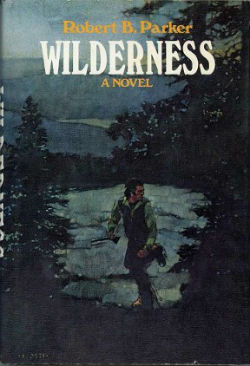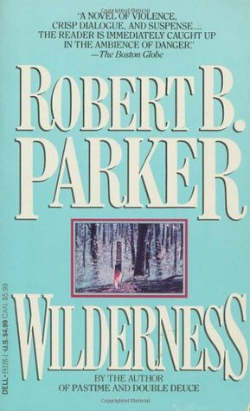 I’ll always love Robert B. Parker. He’s not the best writer I’ve ever read, nor is he the most consistent. Doesn’t matter. I discovered him in high school, when all I cared about was being entertained, and Robert B. Parker was as entertaining as hell. His books were funny and exciting and wise. I bought them the day they were released. (Remember how all the kids used to line up to buy Harry Potter books as soon as they were released? That was me in the early 90s—one scrawny weirdo in Arkansas hitting the bookstore at 9 a.m. on Tuesday morning to see if the new Parker was in yet.) The first shelf I hit in any used bookstore was the P under Mystery to see if they had any old Parkers. I read Parker like my friends listened to albums or watched sports. I looooooooooved Robert B. Parker.
I’ll always love Robert B. Parker. He’s not the best writer I’ve ever read, nor is he the most consistent. Doesn’t matter. I discovered him in high school, when all I cared about was being entertained, and Robert B. Parker was as entertaining as hell. His books were funny and exciting and wise. I bought them the day they were released. (Remember how all the kids used to line up to buy Harry Potter books as soon as they were released? That was me in the early 90s—one scrawny weirdo in Arkansas hitting the bookstore at 9 a.m. on Tuesday morning to see if the new Parker was in yet.) The first shelf I hit in any used bookstore was the P under Mystery to see if they had any old Parkers. I read Parker like my friends listened to albums or watched sports. I looooooooooved Robert B. Parker.
I once heard a guy at a crime convention opine that he had to give up on Parker because the wisecracking and headcracking Spenser—Parker’s signature creation—was just too perfect. I know what that guy meant. I also don’t care.
I write noir—dark noir. I read a lot of noir. I watch a lot of noir. I’m up to my eyeballs in flawed heroes and antiheroes and outright villains. Sometimes you want a hero. Sometimes you want Spenser.
If, however, you’re wondering what Parker looks like when he’s not working in the hero groove you can explore some of his other creations. Jesse Stone and Sunny Randall and his cowboy heroes all tend to be a little more rough around the edges. (In a way, the relative imperfection of these protagonists underlines the deliberate nature of Parker’s creation of Spenser as the figure of the perfect man. He’s an aspirational figure.) Perhaps the most interesting work he did in the decidedly non-heroic arena, however, were in his stand alone novels.
 His 1983 romance Love and Glory is part coming-of-age story and part-Gatsby meditation. His 1995 All Our Yesterdays is a three-generation epic about a family of Boston cops. As different as they are, both of these books deal with the overarching theme running through so much of Robert B. Parker’s work: the tribulations of romantic obsession. Love and Glory ultimately ends on a note of triumph. All Our Yesterdays is a bit more ambiguous.
His 1983 romance Love and Glory is part coming-of-age story and part-Gatsby meditation. His 1995 All Our Yesterdays is a three-generation epic about a family of Boston cops. As different as they are, both of these books deal with the overarching theme running through so much of Robert B. Parker’s work: the tribulations of romantic obsession. Love and Glory ultimately ends on a note of triumph. All Our Yesterdays is a bit more ambiguous.
Of particular interest is his first stand alone novel, 1979's Wilderness. It tells the story of a middle-aged author named Aaron Newman who writes macho books but faces a real-life crisis when he witnesses a murder. He fingers the killer—a gangster named Adolph Karl—to the cops, but when his wife, a fiercely independent professor named Janet, is terrorized by the bad guys, Newman and Janet decide to strike back.
Unlike most of his PI novels, which tend to begin with the obligatory meeting-the-client scene, Wilderness begins with a bang:
It was Wednesday and the sky was a flat acrylic blue when Aaron Newman saw the murder. He was jogging home from the health club along the railroad tracks. His biceps were pumped up from forty-five curls, his pectorals swollen from forty-five bench presses, his latissimus dorsi engorged from forty-five pull downs. His legs felt loose and easy and the sweat seemed to oil the hinges of his body as he ran. His breathing was easy and spring was still left in his calves. Ahead of him, where the road looped in close to the tracks, he saw a tall gaunt man with black hair slicked back fire three shots into the head of a kneeling woman. The gun was short and gray, and after the third shot the man slipped it under his coat and got into a blue Lincoln with an orange vinyl roof and drove away.
You can practically hear 70s-era Parker in those lines, not just in the details of the slicked-hair bad guy with the orange vinyl car roof but in the way the author name checks the different muscle regions. Parker never completely lost his enthusiasm for writing about dudes working out, but as he got older the interest dwindled.
What stayed consistent, though, was his interest in the ways men and women negotiate power within a relationship. If Spenser and his paramour Susan Silverman strike some readers as being too blissfully in love, few readers will have such complaints about the tortured marriage at the center of Wilderness. When they’re not grappling over authority and autonomy in somewhat stilted language (“The pressure of your thwarted romanticism is not pleasant,” Janet tells Aaron at one point), they’re hatching a fairly inexplicable plan to kill some guys. This is not a heroic couple.
Of course, the difference here is that while Spenser and Susan are the picture of a happy and contented domestic bliss, Aaron and Janet are a vision of marital dysfunction. The source of the dysfunction, as it so often is in Parker, lies with the imbalance between the man’s overwhelming desire to possess the woman and the woman’s deep need for independence:
He hated to be out when she came home. He loved to see her come home from work. She dressed so well. Her makeup was so perfect. She was so in charge with her black briefcase and her tailored clothes and her hair in perfect order. She always looked so beautiful that he wanted to make love to her on the couch with her clothes still on in an explosion of affection and desire. He never did, though. She never wanted to. Always had to be when she said, and under her circumstances. Control. She’s always gotta be in control.
In the Spenser novels, you see these same themes worked over in two opposing ways. The first way is through the Spenser-Susan relationship. They hit a rough patch in the early 80s (when Parker and his wife Joan separated for a time) before finding a happy domestic balance in the mid-80s (around the same time the Parkers reunited). The second way these themes surface, however, is through the unending litany of broken marriages that Spenser comes across in his adventures (marriages not unlike the one between Aaron and Janet). Parker might have been a romantic, but that doesn’t mean that he thought every romance ended with a kiss. Spenser and Susan were an exception to the rule.
The antiheroes occupying the center of Wilderness are a messy middle ground between those two poles—between the perfect couple and the crumbling marriage. The novel seems to see no way to resolve the tension between desire and control that doesn’t involve violence. By the end of the book, the shared act of killing is a kind of natural aphrodisiac for Aaron and Janet. The novel has the arch of a twisted romance.
Wilderness is a flawed book to be sure, but for Parker fans it will help to illuminate some of the darker themes that run beneath the surface of so much of the author’s work.
Jake Hinkson is the author of several novels, including the newly-released The Big Ugly.

Just a thank you shout out to you for your wonderful article about Parker. I’m new to his books (but unlike you, I’m old as in 70!) and was introduced to him through his Spenser series. I’m half way through it and abosolutely love his writing. I decided to try a stand alone novel so read ALL OUR YESTERYEARS and found it riveting. Reading your article was like being part of a fine book club gathering in a warm and welcoming independent book store. Now I’ll just have to look into YOUR books for reading! Meanwhile, your analysis of Parker’s writing clarified my muddled thoughts and helped me enjoy his books even more….is that possible? Thank you again, Jake! (I knew I’d enjoy your article – our youngest is named Jake who is an English teacher and singer/song writer who has a wonderful way with words – must be the name!) Hope you’re having a great summer…Adrienne in Minnesota 🙂